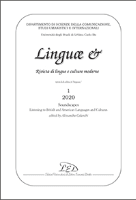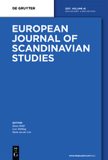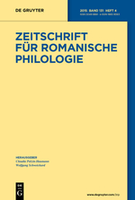
Lingue Antiche e Moderne
Scope & Guideline
Advancing Linguistic Knowledge Across Eras
Introduction
Aims and Scopes
- Linguistic Pedagogy:
The journal emphasizes innovative approaches to language teaching, particularly in ancient and modern languages, reflecting on methodologies and case studies that enhance language education. - Translation Studies:
Exploring the nuances of translation across different languages and periods, the journal investigates the role of translation in cultural exchange and its impact on literary works. - Multilingualism and Language Contact:
Research on the interactions between various languages, particularly in historical contexts, is a core focus, highlighting how multilingualism shapes cultural and linguistic identities. - Literary Analysis:
The journal publishes analyses of literary works that engage with themes of memory, identity, and cultural dialogue, often through the lens of ancient texts and their modern interpretations. - Historical Linguistics:
Investigations into the evolution of languages, focusing on diachronic changes, syntactic structures, and lexical developments, particularly from Latin to contemporary languages.
Trending and Emerging
- Interdisciplinary Approaches:
There is a noticeable trend towards integrating various disciplines such as history, sociology, and cultural studies into language research, enhancing the understanding of linguistic phenomena in broader contexts. - Focus on Multilingualism:
Research highlighting the complexities of multilingual environments, particularly in educational settings, has increased, reflecting a growing recognition of the importance of language diversity. - Cognitive Linguistics:
Emerging studies are utilizing cognitive linguistic frameworks to explore how language shapes thought and cultural perceptions, indicating a shift towards more innovative linguistic methodologies. - Contemporary Relevance of Classics:
An increasing number of papers are examining the relevance of classical texts in contemporary society, suggesting a renewed interest in how ancient literature influences modern narratives. - Cultural Memory and Identity:
Themes related to memory, nostalgia, and identity in literature are gaining prominence, showcasing how language and literature interact with personal and collective histories.
Declining or Waning
- Traditional Grammar Studies:
Research focused solely on traditional grammar rules and structures seems to be waning, as the journal increasingly favors more functional and cognitive approaches to language. - Narrowly Defined Literary Genres:
Specific studies on narrowly defined literary genres, such as classical poetry, are appearing less frequently, suggesting a broader thematic exploration in literary analysis. - Historical Textual Criticism:
The focus on textual criticism of ancient manuscripts is diminishing, possibly indicating a shift towards more interdisciplinary approaches that integrate historical linguistics with cultural studies. - Static Language Comparisons:
Comparative studies that do not consider the dynamic nature of language change are less common, as the journal embraces more contextual and interactional perspectives. - Local Language Studies:
Research focused exclusively on local or regional languages appears to be declining, as the journal increasingly emphasizes global linguistic interactions and multilingual contexts.
Similar Journals

Anuari de Filologia-Llengues i Literaturas Modernas
Exploring the frontiers of contemporary philology.Anuari de Filologia-Llengues i Literaturas Modernas is a distinguished academic journal published by the Universitat de Barcelona, specifically the Facultad de Filologia. This journal focuses on the fields of modern languages and literatures, aiming to foster scholarly dialogue and disseminate groundbreaking research in linguistics and contemporary literary studies. With its open access model established in 2011, it ensures that research findings are freely available to a wide audience, enhancing visibility and impact in the academic community. Although the journal's H-index and Scopus ranking are currently not available, its ongoing commitment to high-quality peer-reviewed scholarship plays a crucial role in advancing knowledge in the humanities. Positioned as a valuable resource for researchers, professionals, and students alike, the journal invites contributions that push the boundaries of understanding within modern philology and cultural studies.

Estudios Romanicos
Bridging Disciplines Through Open Access ResearchEstudios Romanicos, published by the Universidad de Murcia, is an esteemed open-access journal that has significantly contributed to the fields of Linguistics, Language, Literature, and Literary Theory since its inception in 1978. With an impact factor that elevates it to Q3 in Linguistics and Language and Q2 in Literature and Literary Theory as of 2023, this journal ranks impressively within its categories—placing it in the 76th percentile for Literature and Literary Theory, making it an essential resource for academic discourse. Based in Murcia, Spain, the journal embraces an open-access model, ensuring that its rich content is accessible to a global audience—fostering collaboration and cross-disciplinary research. The convergence of knowledge from diverse linguistic and literary perspectives allows researchers, professionals, and students alike to engage with cutting-edge scholarship and extend the boundaries of their own studies.

Language and Linguistics
Elevating Academic Discourse in Language StudiesLanguage and Linguistics is a leading academic journal published by ACAD SINICA, INST LINGUISTICS, based in Taiwan. Established in 2008, this journal has rapidly gained recognition within the field of linguistics, achieving a commendable ranking of Q2 in the 2023 category quartiles and holding positions in the top percentiles of Scopus rankings for both Arts and Humanities and Social Sciences. With an ISSN of 1606-822X and an E-ISSN of 2309-5067, the journal aims to foster the development of linguistics research by providing a platform for the dissemination of innovative and interdisciplinary studies. While it currently operates on a traditional subscription model, its significant contribution to the advancement of linguistic theory and its applications makes it an invaluable resource for researchers, professionals, and students alike. Spanning converged years from 2008 to 2024, Language and Linguistics continues to shape the dialogue in understanding language phenomena and encourages submissions that push the boundaries of current linguistic knowledge.

Etudes Romanes de Brno
Advancing Scholarly Discourse in the HumanitiesEtudes Romanes de Brno, published by Masaryk University, Faculty of Arts, is a distinguished academic journal that has been contributing to the fields of Linguistics and Language as well as Literature and Literary Theory since its inception. With an ISSN of 1803-7399 and E-ISSN 2336-4416, this open-access journal has been a valuable resource for scholars since 2009, enhancing accessibility to a broad audience of researchers and students in the Czech Republic and beyond. The journal's impact is underscored by its categorization in the Q2 and Q3 quartiles for literature and linguistic studies as of 2023, reflecting its commitment to rigorous academic discourse. With Scopus rankings placing it in the 57th and 31st percentiles for its respective fields, it continues to attract high-quality submissions that explore contemporary issues in literary studies and language analysis. Etudes Romanes de Brno promises to remain an essential platform for the exchange of scholarly ideas, fostering growth and innovation in the humanities.

Linguae &-Rivista di Lingue e Culture Moderne
Advancing Research in Modern Languages and CulturesWelcome to Linguae &-Rivista di Lingue e Culture Moderne, an esteemed open-access journal dedicated to the interdisciplinary exploration of modern languages and cultures. Published by LED EDIZIONI UNIV, this journal has been a vital resource since 2002, fostering scholarly dialogue and promoting research across various aspects of linguistics, literature, and cultural studies. With its ISSN 2281-8952 and E-ISSN 1724-8698, Linguae aims to connect researchers, professionals, and students by providing a platform for innovative ideas and critical analyses. Although currently lacking a designated HIndex and Scopus ranking, its commitment to quality and academic rigor makes it a significant contributor to the field. The journal’s open-access policy ensures that its rich array of articles and research findings are readily available to a global audience, promoting an inclusive academic environment. Join an engaged community of scholars by reading and submitting to Linguae, where the vibrant interplay of languages and cultures is thoroughly examined.

European Journal of Scandinavian Studies
Connecting scholars through innovative research in Scandinavian studies.European Journal of Scandinavian Studies is an esteemed journal published by Walter de Gruyter GmbH, dedicated to advancing scholarship in the fields of Cultural Studies, Linguistics and Language, and Literature and Literary Theory. Since its inception in 2010, the journal has been a pivotal platform for researchers and scholars, showcasing cutting-edge research and critical discussions pertaining to Scandinavian languages and cultures. With an ISSN of 2191-9399 and an E-ISSN of 2191-9402, the journal emphasizes accessibility to impactful academic work, despite its current non-open access model. While the journal is categorized within the Q4 quartile for Cultural Studies and Linguistics/Language, it has shown notable potential in ranking higher in its specialized domains, fostering a growing community of researchers invested in Scandinavian studies. The journal's office is located in Berlin, Germany, further enriching its European scholarly context. As it continues to evolve, the European Journal of Scandinavian Studies serves as a vital resource for academics seeking to engage deeply with the multifaceted aspects of Scandinavian culture and linguistics.

GERMANISCH-ROMANISCHE MONATSSCHRIFT
Connecting Cultures through Scholarly ExplorationGERMANISCH-ROMANISCHE MONATSSCHRIFT, published by UNIVERSITATSVERLAG C WINTER HEIDELBERG GMBH, is a vital academic journal dedicated to the fields of linguistics, literature, and literary theory. With its ISSN 0016-8904, this journal fosters scholarly discussions and disseminates innovative research that intersects Germanic and Romance languages and literatures. While it does not currently offer Open Access options, its contributions have positioned it within the Q4 quartile in both Linguistics and Language, and Literature and Literary Theory according to the 2023 category rankings. The journal's Scopus ranking reflects its emerging place within the academic community, situated at the 40th percentile for Literature and Literary Theory, and the 20th and 18th percentiles within Language and Linguistics, respectively. Scholars and students are encouraged to engage with this resource as it offers a platform for new perspectives that are pivotal to understanding the complex interrelations of these linguistic traditions, enriching both teaching and research initiatives.

ZEITSCHRIFT FUR ROMANISCHE PHILOLOGIE
Bridging Historical Insights with Modern Literary DiscourseZEITSCHRIFT FUR ROMANISCHE PHILOLOGIE, published by Walter de Gruyter GmbH, stands as a prominent peer-reviewed journal dedicated to the fields of Linguistics, Literature, and Literary Theory. Established in 1877 and continuing its legacy to the present day, this esteemed journal offers a platform for comprehensive scholarship that explores the intricacies of Romance languages and their literary heritage. With a notable Q1 ranking in Literature and Literary Theory and a Q2 ranking in Linguistics and Language, it has secured its place among leading resources in the humanities. Researchers, educators, and students benefit from its rich historical context and current contributions to the understanding of Romance languages and literature. Though currently not available as Open Access, the journal prioritizes the dissemination of high-quality research, making significant strides in fostering academic dialogue and advancement. Its address at Genthiner Straße 13, Berlin, Germany, situates it in a hub of scholarly activity, bridging the past with contemporary literary discourse.

Caplletra
Exploring the Boundaries of Language and LinguisticsCaplletra is a distinguished open-access journal dedicated to the field of linguistics and language studies, published by PUBL ABADIA MONTSERRAT since its inception. Based in Barcelona, Spain, this journal has been a vital resource for researchers, professionals, and students engaged in the intricate explorations of language and its applications since its transition to open access in 2005. Despite its current quartile ranking of Q4 within the Linguistics and Language category as of 2023, Caplletra continues to serve as an inclusive platform, fostering a dialogue that encourages a diverse range of scholarly contributions. Covering an expansive scope in the converged years from 2018 to 2024, it plays a crucial role in disseminating innovative research and insights. With its ISSN 0214-8188 and E-ISSN 2386-7159, Caplletra is committed to making academic work accessible to all, enhancing the landscape of linguistic scholarship and reflecting the evolving nature of language studies.

Verba-Anuario Galego de Filoloxia
Exploring Linguistic Landscapes: Where Research Meets TraditionVerba-Anuario Galego de Filoloxia is a prominent academic journal published by UNIV SANTIAGO COMPOSTELA, dedicated to advancing the field of linguistics and language studies. Hailing from Spain, this journal provides a vital platform for researchers, educators, and students interested in Galician philology and its broader linguistic implications. Although it operates under traditional access models, the journal’s commitment to quality research is reflected in its categorization within Q3 in Linguistics and Language for 2023, showcasing its significant contributions to the field. Encompassing a convergence period from 2017 to 2024, Verba garners attention in both the Arts and Humanities and Social Sciences domains, with its Scopus rankings highlighting its moderate impact within these categories. By nurturing scholarly dialogue and disseminating innovative studies, Verba-Anuario Galego de Filoloxia plays a crucial role in promoting linguistic research, making it an essential resource for professionals and academic institutions striving to explore the complexities of language and philology.